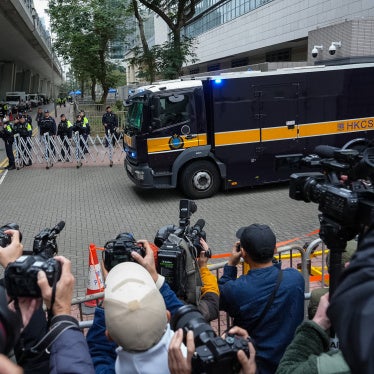The British government has failed to condemn China for breaking its promise of greater democracy in Hong Kong.
If you were told the Chinese government — an unelected, one-party state — will decide who you can vote for, what would your response be? Not only would you likely object, you would expect others, especially democracies, to loudly condemn the idea. But Britain has done just the opposite to the people of Hong Kong, when it failed to call China out for breaking its promise of greater democracy for the island territory.
In a September 4 statement, Britain “welcome[d]” China’s commitment to universal suffrage, and merely noted that the restrictions imposed by Beijing on candidate nominations in Hong Kong — which profoundly undermine whether elections are democratic — will “disappoint” some. If, as the United Kingdom claimed, “the important thing is that the people of Hong Kong have a genuine choice,” it ought to have unequivocally condemned Beijing’s strategy.
On August 31, China’s legislature laid down a strict process for Hong Kong’s top office, ruling out open nominations. Under this system, only those favored by Beijing can be chosen as candidates for Hong Kong’s top office. The move shatters the dream of democracy for most people in Hong Kong, who have long shown their strong desire for the right to choose their own leader. These views have been made abundantly clear in public opinion polls and annual pro-democracy demonstrations; this year, half a million people took to the streets.
The British government appears to have forgotten about the 1984 Sino-British Joint Declaration, an international treaty. Under that binding agreement between the UK and China that set out the terms of Hong Kong’s return to Chinese sovereignty, the territory is promised a “high degree of autonomy,” and that the Hong Kong government can decide all policies on its own except foreign affairs and defense. Yet the September 4 British statement made no reference at all to Beijing’s violations of that agreement. Nor did the UK raise concerns in June when Beijing issued a “white paper” asserting that China has “overall jurisdiction” over the territory, and that Hong Kong’s level of autonomy is dependent on Beijing’s wishes.
Both developments created an immediate uproar from people in Hong Kong. But although Chinese Premier Li Keqiang visited the UK shortly after the “white paper” was released, British Prime Minister David Cameron did not publicly raise the issue of Hong Kong with Li, nor did he protest in any visible way the flagrant breach of a bilateral treaty.
This most recent betrayal of Hong Kong is not an isolated incident. Despite the initial assertion of Cameron’s coalition government in 2010 that it would “stand … firm on human rights in all our bilateral relationships” with China while seeking closer ties, the UK seems to have opted to raise issues only behind closed doors — if at all. The British government, unlike others, chose not to visibly commemorate the 25th anniversary of the Tiananmen Massacre. The UK has been inconsistent in its position toward meeting the Dalai Lama since Gordon Brown’s tenure. And it wasn’t until the waning years of British rule of Hong Kong that limited voting rights were granted.
Such appeasement of China over Hong Kong’s rights is implicitly and sometimes explicitly presented by British officials as necessary for better trade relations. Cameron said, during his visit to China in 2013, that the two countries should deepen “mutual respect and understanding” in order to “remove barriers to trade and investment and partnership between our two countries.”
There is nothing wrong about deepening mutual respect, trade and investment. But a shocking failure to defend basic rights for Hong Kong’s 7 million people has been interpreted by the Chinese government as weakness. One wonders what diktats Beijing issues to London on trade, security or major international issues, or whether London recognizes how its diplomatic, economic and strategic interests are threatened by Beijing’s disdain for human rights.
An immediate concern for the UK ought to be its ability to advocate for fair trials for its citizens detained in China’s Kafkaesque judicial system. In 2009, British citizen Akmal Shaikh was executed after being convicted on drug smuggling charges, despite more than two dozen interventions by the British government arguing that his bipolar disorder warranted a forensic examination that might have exempted him from criminal responsibility under Chinese law. In August 2014, British national Peter Humphrey, who ran a well-known due diligence consultancy, was sentenced to more than two years in prison for “illegally obtaining private personal information.” Humphrey had been forced to confess on national television, and was initially denied the right to have family members and consular officials attend his trial.
Prior to Hong Kong’s return to Chinese sovereignty, many warned about the slow erosion of Hong Kong’s civil liberties, although Britain often failed to sound the alarm.
But “welcoming” Beijing’s decision is a bridge too far, and one that no self-respecting citizen of a democracy should cross. In a March 2013 interview, Chancellor George Osborne said he wanted China to “look to the UK as a home you can base some of your activities in.” Does that mean he would welcome the Chinese Communist Party to dictate who he can vote for? Most probably not.
Sophie Richardson is the China Director at Human Rights Watch.






